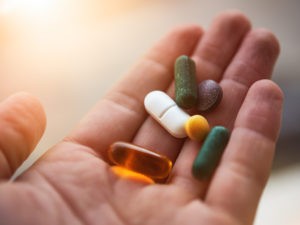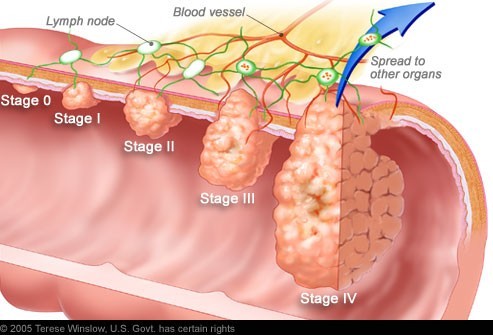Grape seed extract may represent a new therapeutic option to decrease the symptoms of intestinal mucositis (MU) while concurrently impacting on the viability of colon cancer cells
A diagnosis of colorectal cancer at stage 3 or 4 does not have a very good five-year survival rate. That is if you are only thinking conventionally. The standard-of-care for advanced colorectal cancer is surgery followed by aggressive chemotherapy.
MU is a painful side effect that often accompanies toxic chemotherapy.

man hand holding his nutritional supplemets, healthy lifestyle background.
Dismal five year survival rates and painful collateral damage. If you could supplement with a non-toxic, evicence-based anti-oxidant to reduce chemo toxicity while enhancing chemo efficacy, would you? The study linked and excerpted below cites the ability of grape seed extract to reduce the severity of MU while enhancing the efficacy of chemotherapy.
For more information about reducing the risk of collateral damage and enhancing the efficacy of conventional chemotherapy, scroll down the page, post a question or comment and I will reply ASAP.
thank you,
David Emerson
- Long-term Cancer Survivor
- Cancer Coach
- Director PeopleBeatingCancer
Recommended Reading:
“Mucositis is the painful inflammation and ulceration of the mucous membranes lining the digestive tract, usually as an adverse effect of chemotherapy and radiotherapy treatment for cancer.[1] Mucositis can occur anywhere along the gastrointestinal (GI) tract…”
“Conclusion-Topical Vitamin E had performed better on oral MU than Vitamin E systemic administration. Though the efficacy of topical treatment with Vitamin A showed reduction in oral mucositis, it was evaluated in a very small sample which cannot be attributed to a larger sitting.
“Conclusion-Together, these results show that omega-3 fatty acid decreases the mucosal damage caused by 5-FU-induced MU…”
“Conclusion: There is plausible clinical evidence for the administration of several adjunctive treatments for the prevention and treatment of MU.
- Probiotics were reported to reduce the burden of intestinal mucositis and treatment-induced diarrhea-
- Activated charcoal and glutamine are beneficial for chemotherapy-induced diarrhea-
- whereas the administration of honey, zinc, and glutamine reduce the risk of developing oral mucositis during chemotherapy or radiotherapy.
“Results-Compared with 5-Fluorouracil controls, grape seed extract (400–1000 mg/kg) significantly decreased the histological damage score (P<0.05) in the jejunum. Grape seed extract (1000 mg/kg) increased jejunal crypt depth by 25% (P<0.05) in 5-Fluorouracil treated rats compared to 5-Fluorouracil controls, and attenuated the 5-Fluorouracil -induced reduction of mucosal thickness (25%, P<0.05). Grape seed extract (600 mg/kg) decreased myeloperoxidase activity by 55% (P<0.01) compared to 5-Fluorouracil controls. Grape seed extract was more effective at ameliorating 5-Fluorouracil induced intestinal injury, with effects most pronounced in the proximal jejunum. Grape seed extract (10–25 ug/mL) significantly enhanced the growth-inhibitory effects of 5-Fluorouracil by 26% (P<0.05) in Caco-2 cells and was more potent than 5-Fluorouracil at 50–100 µg/mL.
Conclusion-Grape seed extract may represent a new therapeutic option to decrease the symptoms of intestinal MU while concurrently impacting on the viability of colon cancer cells.”
APPIP ERROR: amazonproducts[
AccessDeniedAwsUsers|The Access Key Id AKIAJAJ37JVNL7OUU4CA is not enabled for accessing this version of Product Advertising API. Please migrate your credentials as referred here https://webservices.amazon.com/paapi5/documentation/migrating-your-product-advertising-api-account-from-your-aws-account.html.
]




